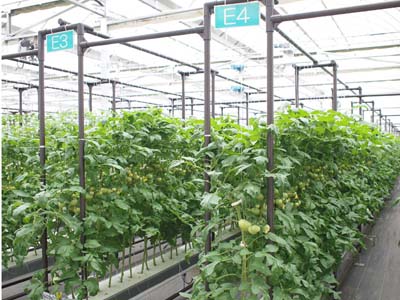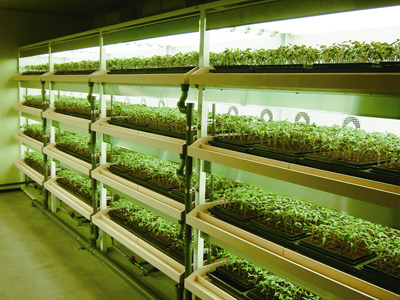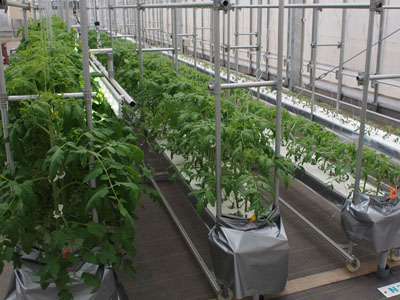Inquiries Concerning News
Corporate Communications Div.,
The Mitsubishi Chemical Group
TEL: +81-3-6748-7140
Test Facilities for Solar Powered Plant Factory on Chiba University Campus Completed
Jun. 14, 2011
Mitsubishi Plastics Inc.
MKV Dream Co., Ltd.
A consortium centered on Mitsubishi Plastics Inc. (head office: Chuo-ku, Tokyo; President Hiroshi Yoshida) and MKV Dream Co., Ltd., (head office: Chuo-ku, Tokyo; President Katsutoshi Ogihara) has been working on the construction of facilities for a solar powered plant factory in the Center for Environment, Health, and Field Sciences, Chiba University, as a project sponsored by the Ministry of Agriculture, Forestry and Fisheries to verify the practicality of and exhibit a model greenhouse plant factory and conduct training. We are proud to announce that the facilities have been completed.
Working mainly with MKV Dream, a top manufacturer of agricultural materials, the Mitsubishi Plastics Group is developing a solar powered plant factory that makes use of functional covering material and hydroponics (nutri-cultivation) for commercial greenhouses, closed transplant production system, supplementary light system, etc. In 2009, the Ministry of Agriculture, Forestry and Fisheries openly recruited companies to take part in a project to verify the practicality of and exhibit plant factories and train staff in order to spread and expand the plant factory business. Mitsubishi Plastics, MKV Dream, and other Mitsubishi Plastics Group companies formed a consortium organized by Associate Professor Toru Maruo of Chiba University and participated in the project centered on Chiba University. Since the fall of last year, work has progressed on constructing a solar powered plant factory with an optimal production system for tomatoes in the Center for Environment, Health, and Field Sciences, Chiba University.
The objective for the consortium is to create a business model for a low-cost, low-agrochemical plant factory that provides a stable supply of tomatoes with a sugar content of around 6%. Top-quality seedlings are grown in the closed transplant production system Nae Terasu™, which uses artificial light, and then Kotodo® Tomatoes are grown using a single-level high-density hydroponic system (Tomatorina™) in a commercial greenhouse that incorporates UV-cutting highly functional films and moisture-permeability curtains. Yield per unit area will be maximized through various efforts such as installing transfer benches to move the actual tomatoes in the greenhouse, and using spot supplementary LED lighting during important growth phases. With normal tomato production, the annual yield per 10 acres is around 20 tons, but the consortium is aiming to produce 50 tons of Kotodo® Tomatoes annual, twice the yield of normal production, in the solar powered plant factories.
The facility is being used to verify various items such as productivity, costs, energy savings, and labor savings, but Mitsubishi Plastics also plans to verify the economics of the envisioned business by conducting trial sales of Kotodo® Tomatoes harvested from the facility through distributors.
The Mitsubishi Plastics Group is providing agricultural businesses with solutions and expanding its business by aggressively developing new products and technologies such as solar powered plant factories and hydroponic technology for medicinal plants (licorice root).
 |
Facilities in the Center for Environment, Health, and Field Sciences, Chiba University, to verify practicality of solar powered plant factory |
 |
Naeterasu™, a closed transplant production system using artificial light |
 |
The impact of transfer benches and LED supplementary light is also being tested in parts of the facilities |
|
■Inquires regarding this material should be directed to the |
|
|
Public Relations Section, General Administration Dept., TEL: +81-3-3279-3800 |
|
